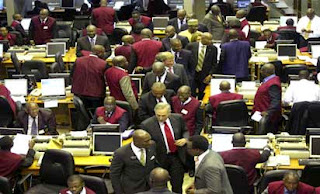February Polls: Long-term Investments Suffer Major Setback
LEADERSHIP investigations show that local and foreign investors are being cautious about making long-term investments because of the forthcoming general election among other issues confronting Nigeria's macro-economic environment.
This stance, they maintain, is due to the perceived uncertainty over the outcome of the coming elections, particularly the presidential poll. They argue that long-term investment requires stable political and macro-economic environment to thrive. Discerning investors are usually wary to make investment decisions during periods of general election because they are usually characterised by instability and uncertainty.
Another reason for the lull, analysts maintain, is because funds which come mainly from government have been channeled into electioneering activities, thus leaving less room for investment decisions.
According to the director-general of the Lagos Chamber of Commerce and Industry (LCCI), Muda Yusuf, the political transition process has far reaching implications for the economy. Political and social stability are critical factors driving investor confidence and investment in the country.
Noting that new investors in the country would like to wait to see the outcome of the election, Yusuf said: "The heightened tempo of electioneering activities has led to injection of significant amount of funds into the economy through various channels of political campaign finance.
"The main sources of the funds are state funds, funds provided by candidates contesting elections, political party funds and proceeds of corruption. Some segments of the economy have benefited tremendously from these spending. They include the media houses, logistics providers for political rallies, printers of posters and banners, crowd mobilisation contractors, and hotels in major cities because of the itinerant nature of politicians at this time."
He pointed out that there is also the aspect of spending that is undertaken by the electoral body, INEC, pointing at procurement of ballot papers, ballot boxes, vehicles for logistics, and various printing jobs among others. Suppliers of these materials would be major beneficiaries of the current political transition expenditure, while there will also be job creation through the recruitment of numerous ad-hoc staff, he noted
All these, he said, would impact the economy positively, especially where such procurements are done locally.
He, however, noted that governance at all levels of government had slowed down as political leaderships are engrossed in electioneering campaigns.
"Important matters requiring approvals of the political leadership may not get the right attention at this time. Investments and projects that are dependent on such approvals will experience some challenges at this time," he said.
"Political transition periods come with possibilities of changes in government in power, changes in individuals occupying political positions, changes in policy direction and changes in priorities of government.
"These possibilities increase the political risk of investment during periods of political transition. Investors will, therefore, be very cautious in taking major investment decisions until after the elections."
The managing director of APT Securities and Funds Ltd, Garba Kurfi, said that the nation's bourse had been experiencing high volatility and unpredictable fluctuations due to the forthcoming elections and over reliance on foreign investors, pointing out that investors, especially foreign ones, are waiting to see the outcome of the elections.
He added that there would a boom in the cement industry after the election, as about nine new state governors would want to embark on infrastructure development as key project.
He asserted that economic activities, by both local and foreign investors, would be determined by the outcome of the elections.
Head of Research at Sterling Capital, Sewa Wusu, while hoping for a smooth transition following the February general election, noted that investors had become cautious in investing in the country ahead of the elections.
Although he did not give figures in terms of investment inflows into the country, he said the political tension in the country had heightened investors' fear of putting their resources in the country.
"Normally, investors adopt a cautionary stance in an election year, but the increased political tension in the country has worsened the fear. We have had elections before now but this is different. Hopefully the peace pact signed recently will help reduce the tension," he stated.
In Information and Communications Technology (ICT) sector, especially telecommunications subsector, most of the investments expected from major telecom operators who drive the ICT industry are hanging as a result of the fear of the violence that may ensue after the general election.
Major telecom operators who normally make public their investment plans for each new year have remained silent. Also, the fear of the outcome of the elections is also being attributed as one of the reasons for stalled the 2.6 GigaHertz spectrum auction that would have taken place in December 2014, with the telecommunications regulator, Nigerian Communications Commission (NCC), putting it on indefinite suspension.
Industry players say the telecom licence auction with a base price of N34.8 billion is being frustrated by lack of interest from telecom operators who have adopted a 'wait and see' attitude.
"It is unfortunate that the two licences-Broadband Infrastructure Companies (InfraCos) and the 2.6GHz are being programmed few weeks to the general election in Nigeria. No discerning investor will stake his money at this critical period. They will prefer that any telecom auction will take place after the general election," said a top official of the one leading mobile operators who does not want his name mentioned.
The NCC had planned to auction seven licences in Lagos and the six geopolitical zones since the third quarter of 2014, without success. The regulator wanted to start with pilot auctions in Lagos and North Central Zone, but the process is said to be stalling as a result of non-competitive bidding from major service providers in the country who have the bulk of investments in fibre-optic cable and copper infrastructure scattered across the country.
Source: LEADERSHIP
like us on Facebook: http://facebook.com/nigerianewsbeat
Follow on Twitter: http://twitter.com/nigerianewsbeat









0 comments:
Post a Comment
All messages considered as Spam will be removed